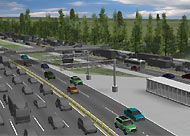Article from: www.thenewspaper.com/news/24/2427.asp
6/17/2008
Virginia: Foreign Corporation Gets US Money for Toll Road
A foreign corporation will enjoy 80 years of profit after using $1.6 billion in taxpayer funds to build toll lanes in Virginia.
 The US Department of Transportation announced last Thursday that it had issued $589 million in tax-free bonds for the benefit of a foreign corporation that will use them to create High Occupancy Toll lanes on the Capital Beltway in Northern Virginia, just outside Washington, DC. This represents the first time that federal transportation officials have used private activity bonds, a controversial funding method created by state governments to provide tax exemptions to private entities developing public projects.
The US Department of Transportation announced last Thursday that it had issued $589 million in tax-free bonds for the benefit of a foreign corporation that will use them to create High Occupancy Toll lanes on the Capital Beltway in Northern Virginia, just outside Washington, DC. This represents the first time that federal transportation officials have used private activity bonds, a controversial funding method created by state governments to provide tax exemptions to private entities developing public projects.
"This financial transaction represents a historic turning point not only for the way we finance highway projects but also for the thousands of drivers who lose precious time stuck in traffic on one of the nation's most congested highways," US Transportation Secretary Mary E. Peters said in a statement.
The bonds are part of a $1.6 billion package of state and federal taxpayer funds given to a partnership between Transurban, an Australian toll road management firm with 90 percent ownership of the HOT lane venture, and Flour Enterprises, a Dallas-based construction company. In total, federal support comes in the form of $589 million in bonds and $589 million in direct loans while state taxpayers will hand over $409 million in cash. In return, Transurban-Flour will construct and operate the HOT lanes and keep a significant annual profit from the tolls for a total of eighty years, despite only contributing $349 million of their own capital toward the project. This amount represents less than the cost of interest on the $1.9 billion project.
Once the lanes are completed by 2013, motorists who use them would pay $1 a mile during morning and evening rush hours -- although officials stress that there is no upper limit on how high the toll could go. That means a one-way trip would cost $14, or $7000 in new expenses on an annual basis for regular commuters. Unlike traditional toll road construction arrangements, the contract specifies that tolling will continue on the HOT lanes long after motorists have paid the original construction costs with their toll payments. The contract specifies that tolls may continue beyond the year 2088 when the deal with Transurban and Flour expires.
In a footnote to last month's US Supreme Court decision Department of Revenue of Kentucky v. Davis, Justice David Souter questioned the legality of state-issued private activity bonds. He left unresolved whether a state offering selective tax exemptions to in-state corporations over out-of-state corporations might constitute a violation of the Commerce Clause.
 The US Department of Transportation announced last Thursday that it had issued $589 million in tax-free bonds for the benefit of a foreign corporation that will use them to create High Occupancy Toll lanes on the Capital Beltway in Northern Virginia, just outside Washington, DC. This represents the first time that federal transportation officials have used private activity bonds, a controversial funding method created by state governments to provide tax exemptions to private entities developing public projects.
The US Department of Transportation announced last Thursday that it had issued $589 million in tax-free bonds for the benefit of a foreign corporation that will use them to create High Occupancy Toll lanes on the Capital Beltway in Northern Virginia, just outside Washington, DC. This represents the first time that federal transportation officials have used private activity bonds, a controversial funding method created by state governments to provide tax exemptions to private entities developing public projects.